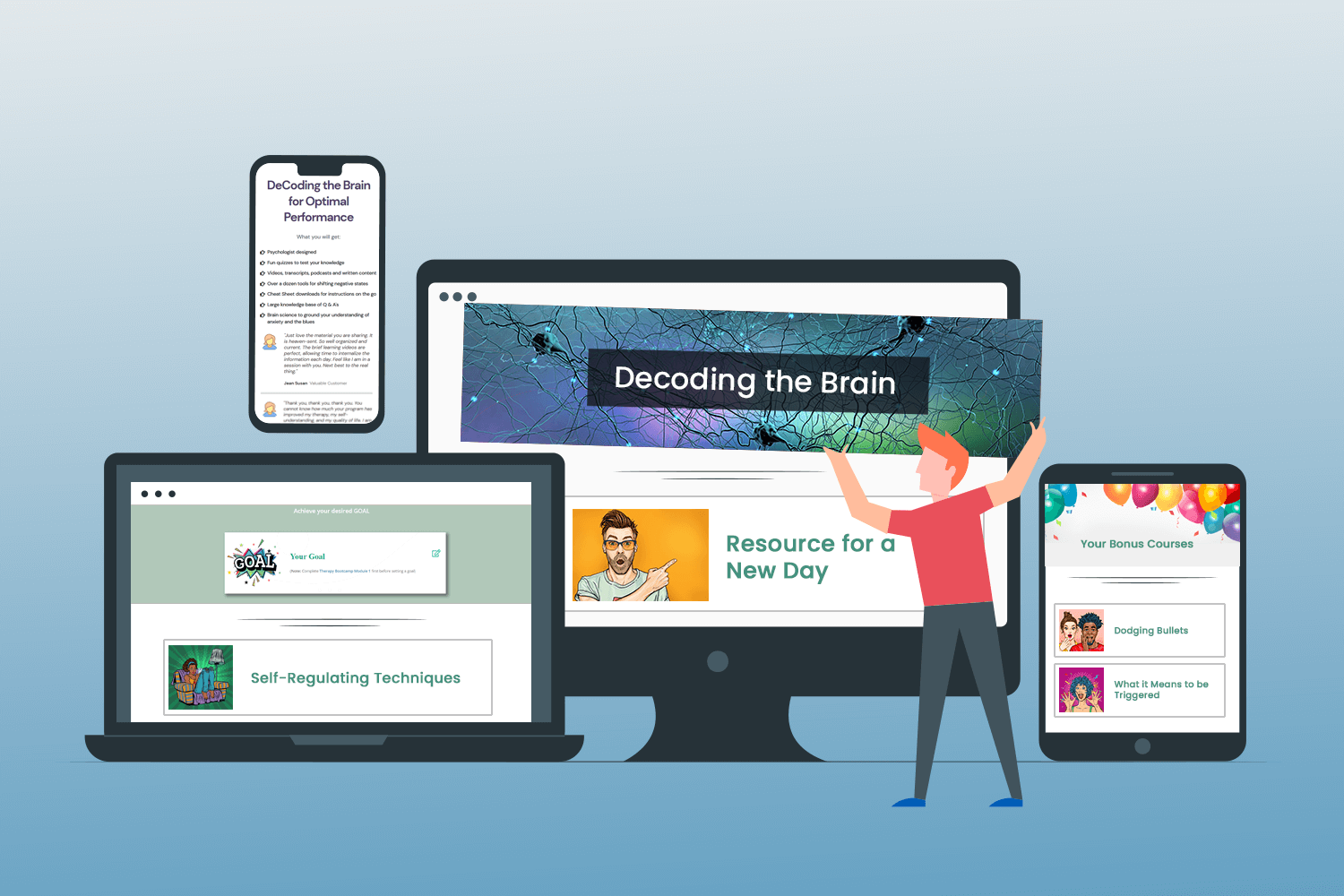"My first attempt at finding a therapist was so unsettling and embarrassing that ten years passed before I tried again."
An emotional conundrum
What if the issue that you struggle with is the exact same issue that prevents you from getting the help you deserve?
Meeting my own needs was never my strong suit. I wouldn't think of myself in these terms, but my thoughts and actions betrayed my life's purpose: to make life better for others.
My needs came second, always.
I figured I'd have to "fake" my way to getting help. I looked too good on the outside (or so I thought 🙂
I ruminated about this for weeks: "what would I have to say to make a therapist take me seriously?"
I walked into a free medical clinic. This was the 70's so they had those things back then (Yeah - no medical insurance required if you can believe that.)
I talked about shin splints, congested sinuses and erratic periods. Then I nonchalantly threw in a question of whether I could speak to the psychologist at the clinic.
She didn't bat an eye and said, "sure".
All I can remember about my chat with the shrink was whether I could get out of bed in the morning. I didn't understand the question. I didn't have any physical problems - yeah sure my mattress was on the floor and it wasn't the easiest to get out of. But yes, I could get out of my bed.
With my response he ceremoniously wished me the best and left it at that. I shrunk into the corner of my chair and left with a ton of guilt for having wasted his time.
For many months leading up to that meeting I was dealing with suicidal thoughts. Of course, we didn't chat about that.
After that session, I was finally certain I was making it all up in my head. There was nothing wrong with me. Others were clearly more desperate. Who did I think I was to be asking for help anyway.
You don't need a reason to get help
You probably have spent 20 years on this planet before considering therapy. You've seen others' reactions, their behaviors, how they experience their world in comparison to yourself. At some level, you know something is off.
Because your fears have never been validated you walk around unconsciously struggling against a part of you that doesn't jive with how you see others experience their world.
Just because you're functioning well in one or even many areas of your life, it doesn't mean that there isn't another part of you that needs help.
You may already know what that is (and why you're reading this article).
In my clinical, professional experience, you have two choices: either deal with it now when you have some measure of control, or later, when chances are, it's much more complicated and messier.
Unfortunately, like me and many others, you're probably choosing the latter. Yeah, pain is a great motivator 😉
The therapist makes all the difference
After two decades of failed therapeutic relationships I finally had the courage to give therapy another try. I eventually found the right therapist and yeah, it made all the difference.
It's not that the new therapist was more extraordinary than the rest - it's just that she had a healthy dose of curiosity (like a scientist). She recognized the signs of trauma and had discovered a treatment that worked relatively quickly.
She saw most "diagnoses" as symptoms of trauma, and based her understanding of a client’s symptoms from that perspective. It was a non-pathological model of mental well-being. (The type of self regulating therapy I describe on this site)
Therapy is a kind of education
Maybe you're concerned about a friend who's depressed. Maybe you're thinking of going to therapy. Or maybe you’ve already been, but you weren't with the right therapist.
In any case, you need to give some thought as to the type of therapy you want, and the type of therapist.
It's wise to consider therapy as an investment in you. Like any investment you do your research. Therapy costs considerable time, energy and money so it makes sense for you to do your due diligence homework first.
I wish I knew then what I know now. I needed to trust my instincts.
Finding the right counselor is a daunting task.
Most people looking for a professional, be it an accountant, lawyer or physician, depend upon the recommendation of someone they trust, such as a friend, family member, or colleague.
But what do you do if you're looking for a counselor and you don't know anyone who's been to therapy?
Or maybe, you don't want to share this part of your life with anyone right now, so asking your family or friends is simply out of the question.
Many professionals have signs and symbols attesting to their reputation and success:
- A lawyer has a track record of cases won.
- A chiropractor has a busy office.
- A contractor has a list of satisfied customers with well-built homes.
But the field of therapy doesn't have those guideposts. The work happens behind closed doors. There are no ads proclaiming "this is a good therapist". There is no source of information that could help you decide if a particular therapist is the one for you.
When you really get how therapy can make your life better and you've made the decision to go, you'll want to give yourself the best chance possible.
What to ask: Making that first call to a counselor
Here are some questions you could ask:
- Are you accepting new clients?
- What are your fees?
- What are your hours?
- What happens in a typical session?
- Do you use any special techniques?
These above are common questions, but try these to get a better sense of your therapist and increase the odds that you'll choose the right therapist:
Caution: Not all therapists are alike!
Over the years I've spoken to many friends and acquaintances about what happens in their therapy. I've been very puzzled at what some have described. You see, not all therapists base the treatment on a good therapeutic relationship.
In most circumstances, what this means is that without a solid relationship it'll be much harder to achieve the deeper changes you're working for.
This is important, because developing a unique relationship with your therapist is often the anchor for all your work.
But academic degrees on the wall won't guarantee that a particular individual can relate in a way that's best for you.
In fact, it's been my experience that the success of your therapy will depend on establishing a good working relationship with your therapist.
The reason I say this is that with a strong connection you'll feel safe enough to go deeper. It's at this deep level that you have the chance for changing you at your core.
I'm talking about the 'feeling freer and happier in your own skin' type of change. You know . . . fundamental change.
Real change means changing memories

BRAIN FACT: How you feel about yourself, whether you like yourself or not, if you feel deserving or entitled to your own needs and a countless other ways you exist within yourself, all of these are based on memories.
These memories - rightly or wrongly - form a sense of you that you refer to as "myself".
These memories start early. They actually begin in the womb.
When you work with memories - basically what you do when you're in therapy - you begin a change process.
Here's how it works to change you fundamentally:

BRAIN FACT: Every time you access a memory you change it - albeit in subtle ways - by virtue of the fact that you absorb whatever your current circumstance happens to be. (The new memory gets added to the old memory.)
Essentially, you can't remember something without slightly “updating” that memory with new information of your current state.
So if I'm sitting with my therapist, sensing her 'feel good feelings' for me, and then I access a deep-seated and painful memory (eg. when my father chased us with a belt), I'm amalgamating the present experience of being with her into this old memory.
So while you can't change the past, you can change your experience of that memory of the past.
Maybe it's just ever so gently that first time. However by working it again from other angles, my automatic reaction to that bad memory completely changes.
So some time later, I'm talking to my friend who's having trouble with her father and I flash back to my own experience. Lo and behold, I don't have the same reaction. I'm calm inside. That memory doesn't carry the same sting it did before.
What does a good connection feel like if you've never had one before?
I also realize that you may not know what this feels like especially if you have had few experiences with good psychotherapists. After all, how can you recognize a good connection if you've never had one in your life?
What do you look for? These essential qualities of a good therapist include attunement, empathy, and being able to really take in what you're saying.
Many of the pages in myShrink contain useful information about therapists who demonstrate these qualities.
I encourage you to find these qualities in your next therapist.
Here's a good place to start:

